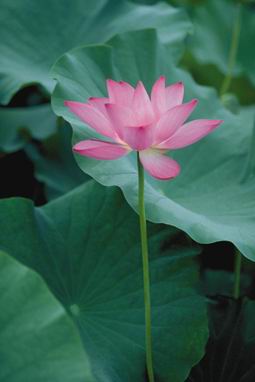
| 1. 發脾氣是短暫的發瘋。 |
| Giving vent to anger is temporary insanity. |
| 2. 我們對生命無所有權,只有使用權。 |
| We do not have a claim on our life, but only the right to use it. |
| 3. 皺眉和微笑都是一個動作表情,何不微笑? |
| A frown and a smile are both possible. Why not smile? |
| 4. 世上有兩件事不能等,一是孝順,二是行善。 |
| There are two things in life that cannot wait, fulfilling filial piety and doing good deeds. |
| 5. 對父母要知恩、感恩、報恩。 |
| Recognize, appreciate and repay your parents' love. |
| 6. 一個人不怕錯,就怕不改過,改過並不難。 |
| One should be afraid not of committing mistakes, but of not correcting them. It's not difficult to correct mistakes. |
| 7. 做好事不能少我一人,做壞事不能多我一人。 |
| Include me when doing good deeds, exclude me when doing evil deeds. |
| 8. 閒人無樂趣,忙人無是非。 |
| An idle man has no pleasure, a busy man has no time for dispute. |
| 9. 改變自己是自救,影響別人是救人。 |
| To change yourself is to save yourself, to influence others is to save other people. |
| 10. 犯錯出懺悔心,才能清靜無煩惱。 |
| Only through repentance of one's sins will one achieve tranquility and relief from worry and anxiety. |
| 11. 做人固然不應將自我看得太重,但也不要看輕自己能力。 |
| Do not think too highly of yourself, and yet, never underestimate your ability. |
| 12. 口說好話,心想好意,身行好事,腳走好路。 |
| Speak good words, have good thoughts, do good deeds, and walk the right path. |
| 13. 口說一句好話,如口出蓮花;口說一句壞話,如口吐毒蛇。 |
| Good words are like lotus flowers blooming on lip; Bad words are like poisonous snakes hissing out from mouth. |
| 14. 人性之美,莫過於誠;人性之貴,莫過於信。 |
| The beauty of humanity lies in honesty. The value of humanity lies in faith. |
| 15. 施比受更有福。 |
| To give is better than to receive. |
| 16. 手心向下是助人,手心向上是求人;助人快樂,求人痛苦。 |
| We help others with our palms down, and we ask for help with our palms up. Helping brings happiness, begging brings pain. |
| 17. 甘願做,歡喜受。 |
| Be willing to do, be happy to bear. |
| 18. 心中長存善解、包容、感恩、知足、惜福。 |
| Always bear in mind the following virtues: understanding, forgiveness, gratitude, contentment, and treasuring your blessings. |
| 19. 做該做的事是智慧,做不該做的事是愚癡。 |
| To do whatever should be done is wisdom, to do whatever should not be done is ignorance. |
| 20. 我們最大的敵人不是別人,而是自己。 |
| Our greatest enemy is probably not others, but ourselves. |
21.
要比誰更愛誰,不要比誰更怕誰。
 |
| Let us compete with who is more loving, not with who is more feared. |
| 22. 為自己找藉口的人永遠不會進步。 |
| We can never improve if we always make excuses for ourselves. |
| 23. 看別人不順眼,是自己修養不夠。 |
| One who constantly looks down on others reveals his lack of moral cultivation. |
| 24. 盡多少本分,就得多少本事。 |
| The more effort you put into your work, the more ability you gain. |
| 25. 屋寬不如心寬。 |
| It is better to have a generous heart than a spacious dwelling. |
| 26. 生氣,就是拿別人的過錯來懲罰自己。 |
| Getting angry is actually punishing ourselves for the mistakes of others. |
| 27. 一個人的快樂,不是因為他擁有的多,而是因為他計較得少。 |
| A person's happiness stem not from how much he owns but from how little he complains. |
| 28. 並非有錢就是快樂,問心無愧心最安。 |
| Money does not necessarily bring happiness. A person with a clean conscience is at peace most. |
| 29. 要批評別人時,先想想自己是否完美無缺。 |
| Before criticizing others, consider whether we are perfect and without fault. |
| 30. 小事不做,大事難成。 |
| If we are unwilling to do little chores, it will be difficult to accomplish great things. |
| 31. 時時好心就是日日好日。 |
| By maintaining a good heart at every moment, every day is a good day. |
| 32. 慈悲心即是清涼地。 |
| A compassionate heart is a clear and cool place. |
| 33. 慈是「與樂」,就是給與一切眾生快樂。 |
| Mercy is "giving happiness", giving all living beings joy and happiness. |
| 34. 沒有數字的代價即為「無量」。 |
| In the same way that a value without a figure is a "limitless amount". |
| 35. 不辭勞苦的付出便是「大慈悲」。 |
Not counting the effort one puts out is
"great compassion". |
| 36. 付出勞力服務,又服務得很歡喜便叫做「喜捨」。 |
| To give one's labor and service happily is more than "joyous giving". |
| 37. 傷在他身,痛在我心。 |
| The injury is on their bodies, the pain is in my heart. |
| 38.不要封閉自己。你要先愛別人,別人才會愛你。 |
| Don't close yourself off. You should love others first, and then others will love you. |
| 39. 唯有尊重自己的人,才更勇於縮小自己。 |
| Only those who respect themselves have the courage to humble themselves even more. |
| 40. 人能和則是非不生。 |
| When people can live harmoniously together, there is no dispute. |
| 41. 人都是求「有」,什麼叫「有」呢?有就是煩惱。 |
| Everyone seeks "to have". What is "to have"? It is to have worries. |
| 42. 君子如水,隨方就圓,無處不自在。 |
| A gentleman is like water, which takes the shape of the container into which it flows. He is comfortable in any situation. |
| 43. 死掉過去的煩惱心,生出今日解脫的境界。 |
| Forget the worries of the past and be free today. |
| 44. 把心胸放開,自然就可斷除煩惱。 |
| If you broaden your mind, you will naturally stop worrying. |
| 45. 自造福田,自得福緣。 |
| Cultivate your own field of blessings and reap your own good fortune. |
| 46. 吃苦了苦,苦盡甘來;享福了福,福盡悲來。 |
| When your suffering is finished, fortune will come ; when your blessings are used up, misfortune will come. |
| 47. 脾氣嘴巴不好,心地再好,也不能算是好人。 |
| If you have a bad temper and a foul mouth, then no matter how good your heart is, you are not a good person. |
| 48. 大錯誤容易反省,小習性不易除掉。 |
| It is easy to think about one's big mistakes, but very hard to get rid of small bad habits. |
| 49. 要學得「平常心」。 |
| Learn to have a steady mind. |
| 50. 有心就有福,有願就有力。 |
| Intentions beget blessings, vows beget strength. |
|
感謝蔡桂月老師提供 |